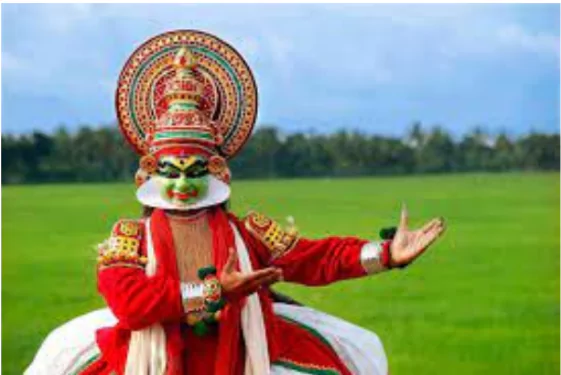Introduction
Kathakali, a traditional dance-drama form from Kerala, combines intricate footwork, elaborate costumes, vibrant makeup, and dramatic storytelling, showcasing the rich cultural heritage of the region.
About Kathakali Dance Form

- It is also called the ‘BALLAD OF THE EAST.
- The recitals represent the eternal conflict between good and evil.
- The language used for Kathakali songs is Manipravalam, which is a mixture of Malayalam and Sanskrit.
- It has evolved from various social and religious theatrical forms of ancient Kerala, including Chakiarkoothu, Koodiyattam, Krishnattam, and Ramanattam.
Kathakali: A Fusion of Dance, Music, and Storytelling
- Kathakali synthesizes dance, music, acting, and storytelling, primarily adapted from Indian epics and combines the four aspects of abhinaya.
- Dancers communicate using codified hasta mudras (hand gestures) and facial expressions, following the sung verses (Padams).
- Textual guidance for Kathakali is found in the Balarama Bharatam and Hastalakshana Deepika.
- Kathakali stories, known as Attakkathas, are drawn from epics and myths.
Enroll now for UPSC Online Course
Artistic Expression: Visual Art and Makeup in Performance Arts
- Costume and makeup are elaborate and aim to create a superhuman effect, adhering to Natya Shastra guidelines.
- Detailed facial make-up, along with headgear, is used for different characters. A mixture of rice paste and lime is applied to create the chutti, a distinctive white facial makeup
- Green indicates nobility, divinity and virtue.
- Red patches beside the nose indicate royalty.
- Black colour is used to indicate evil.
- Yellow colour is for saints and women.
- White beard indicates beings with higher consciousness and divinity.
- A completely red face indicates evil.
|
Characteristics of Kathakali
- The characters in a Kathakali performance are broadly divided into satvika, rajasika and tamasika types.
- Apart from these, there are minor characters like minukku which are the women and sages.
- A simple stage is used with a large oil-fed lamp in front. Two people hold a curtain called Tirasseela on the stage.
- Kathakali employs the entire body extensively, including facial muscles, fingers, eyes, hands and wrists.
- The weight of the body is placed on the outer edges of the feet, which are slightly bent and curved.
- No other dance style uses the movement of the eyebrows, the eyeballs and the lower eyelids as done in Kathakali.
- Kalasams in Kathakali are pure dance sequences allowing the actor to showcase their skills, featuring leaps, quick turns, jumps, and rhythmic coordination.
|
Performance Structure
- It is essentially an all-male troupe performance. It is generally performed in open-air theatres (symbolizing the element of sky).
- It is done in the evening, accompanied by a continuous sound of drums, chhenda and maddala.
- The performance begins with KELIKOTTU, a call to the audience’s attention, followed by TODAYAM, a devotional number to seek God’s blessing.
- It is followed by PURAPPADU, a pure nritta piece, and the musicians and drummers entertain with MELAPPADA, demonstrating their skills.
- TIRANOKKU marks the debut of all characters on the stage other than Minukku.
- Next is ILAKKANAM, where characters display their excellence in abhinaya.
- Throughout the performance, the dancers engage in CHODIATTAM i.e. acting following the padams sung by musicians.
Music and Orchestra
- Kathakali music follows the traditional Sopana sangeet of Kerala, which is the ritual singing of the Ashtapadis on the flight of steps leading to the sanctum sanctorum.
- It has also incorporated Carnatic ragas and talas.
- The orchestra includes instruments like Chenda, Maddalam, Chengila, Ilathalam, Idakka, and Shankhu.
- Proponents: Kathakali was revived in the 1930s by the famous Malayali poet V. N. Menon under the patronage of Mukunda Raja.
- Its famous proponents are Guru Kunchu Kurup, Gopi Nath, Kottakal Sivaraman, Rita Ganguly, etc.
Enroll now for UPSC Online Classes
Conclusion
- Kathakali, deeply rooted in Kerala’s cultural heritage, embodies the state’s artistic prowess and spiritual essence. Its mesmerizing performances continue to captivate audiences worldwide, preserving the rich tradition and legacy of Kerala’s performing arts.

